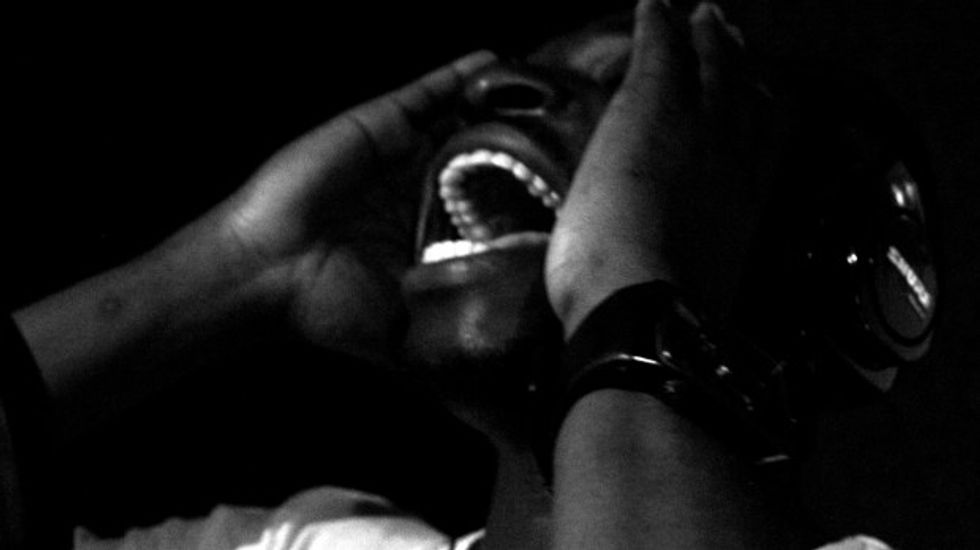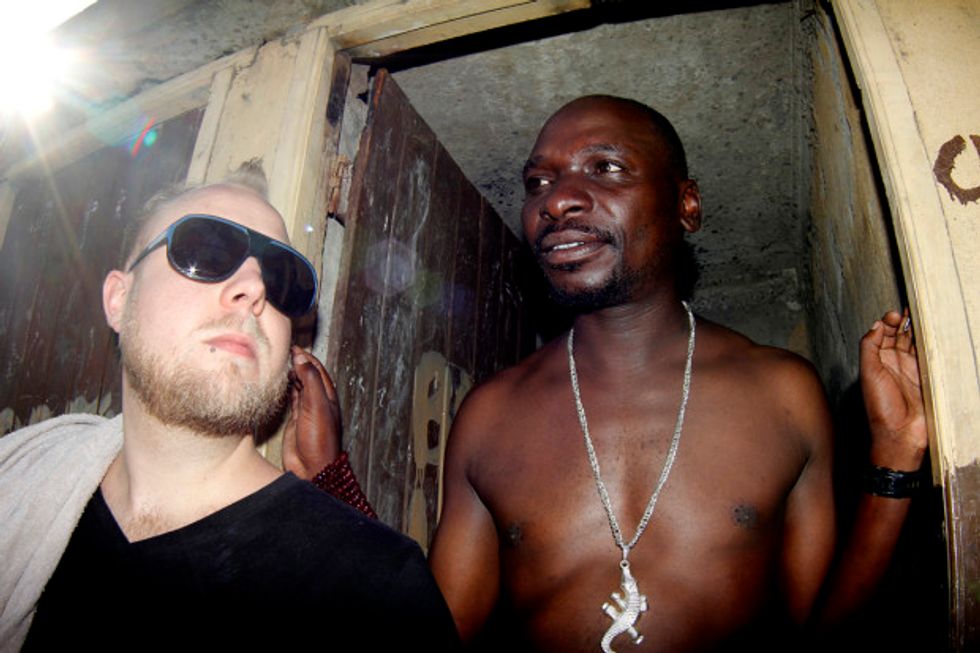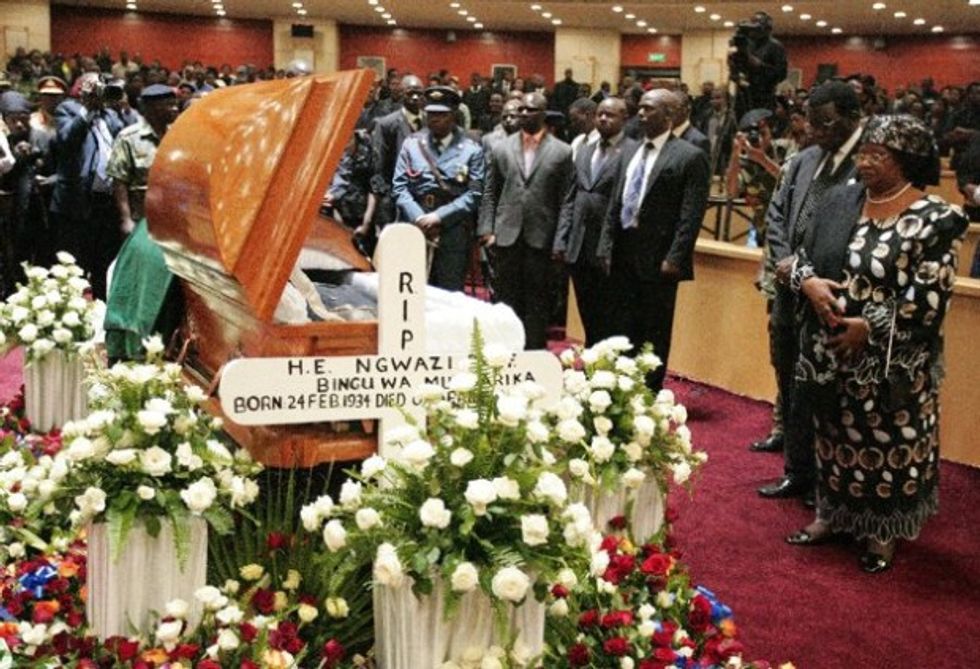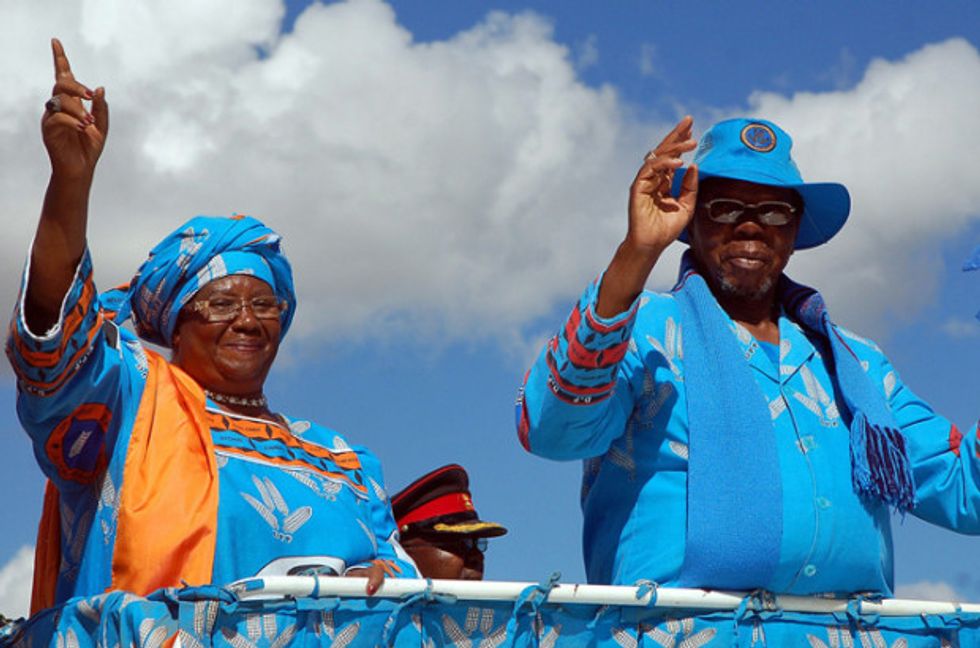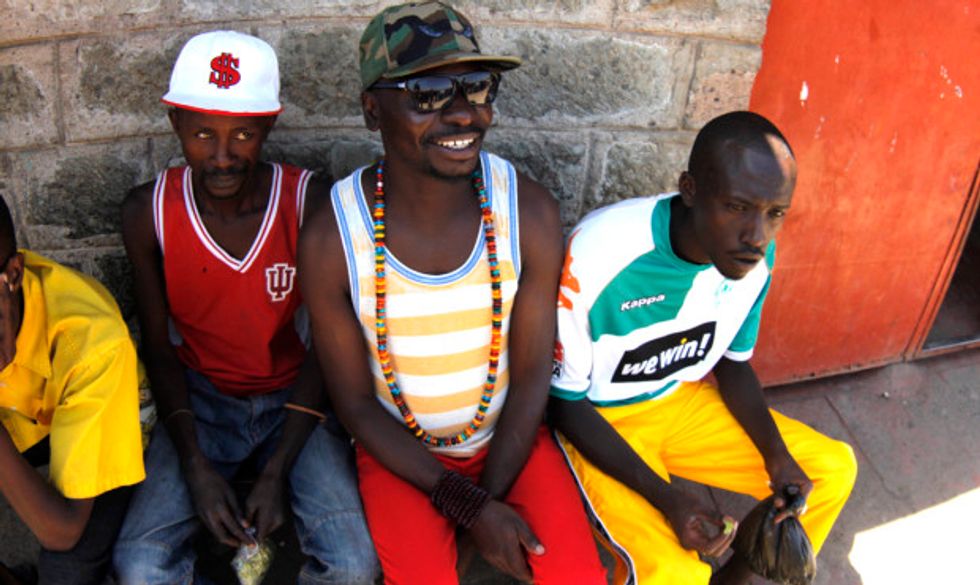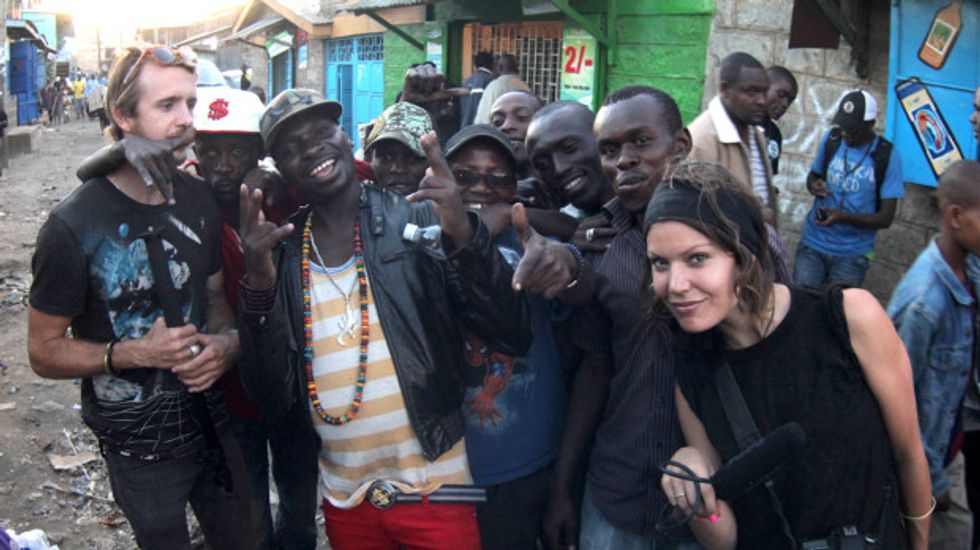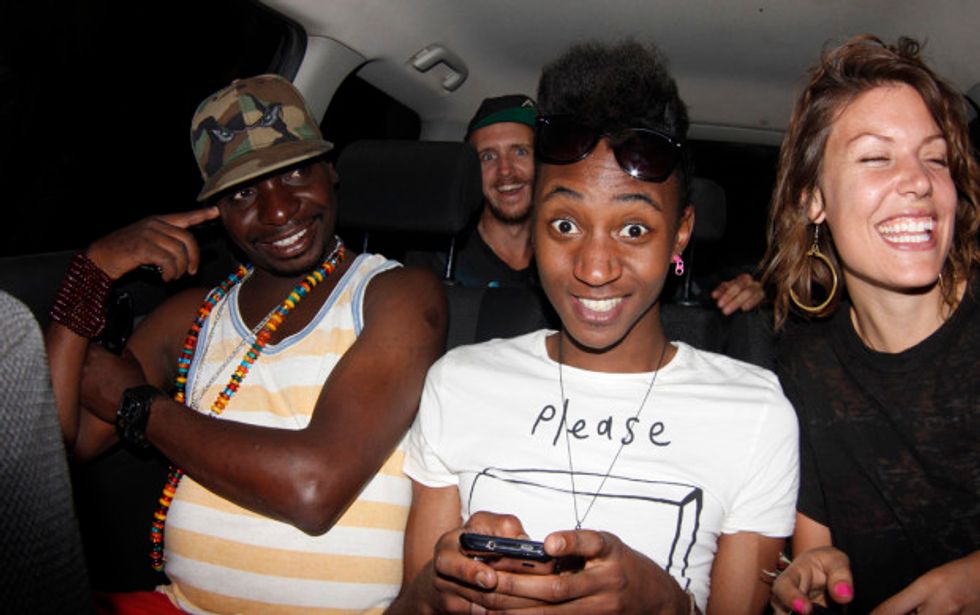
[embed width="600"][/embed]
The Very Best take on the Malawian government in their latest video for "Yoshua Alikuti" (watch below). In our exclusive interview with Johan Hugo and Esau Mwamwaya, they describe how the late president's policies devastated the livlihoods of many Malawians. When Esau and Johan couldn't get fuel for their car during the recording of their forthcoming album in Lilongwe, Esau decided it was time to, as Fela would say, use music as his weapon. In this behind-the-scenes look, we watch the band strut the streets of one of Nairobi's most dangerous slums - entertaining the local population and making friends with goats.
What has The Very Best been up to lately?
Johan: Well! We're suuupeerrr excited to have "Yoshua Alikuti" out finally. Even though we had the Super Mom Mixtape last year, that felt more like something we put out to buy more time to finish the album, and it was the right choice. What came out of the Malawi sessions last September really changed and solidified the new album's sound. We've been very lucky to meet Village Beat who directed the first 3 videos for us in Kenya which was an amazing experience. That 1 week felt like 1 year. Most intense week of my life I think. We also brought Seye Adelekan with us cause he's on the next single, and he co-wrote and played guitar on parts of the new album. It's been amazing working with him on his record too. It's just been really nice to see the ball rolling again and to see the amazing feedback on "Yoshua Alikuti." I really didn't know what people would make of it, but it seems people like it so that's great news!
[embed width="600"][/embed]
Last time you spoke with Okayplayer's Eddie Stats, you talked about finding the 'new sound' of TVB. How has your sound changed on the new records—and do you think "Yoshua Alikuti" exemplifies that new sound?
Johan: Maybe it's still a little bit early to reveal too much about the new album =) , but I guess "Yoshua Alikuti" is a good starting point. There's so many different vibes on the new album I hope it will feel like a journey listening to it. It's true what I said in last Ghetto Palms interview about it being a bit more dancey and darker, I think you can hear that from Yoshua already… some of the people we worked with are probably not expected either. I know its official about Amadou & Mariam, Baaba Maal, K'naan, Seye Adelekan, etc. Some of the co-writers of album are more surprising… but I can't say who they are yet hahaha!
*Esau singing his heart out while recording in Malawi. Photo by Johan Hugo.
What is the back story to "Yoshua Alikuti"? What is the song about?
Esau: It's a political song with a bible reference. Our late president, Bingu wa Mutharika, was given the name "Moses" by the people. Moses, who according to the bible, led the children of Israel out of bondage in Egypt. The song does not only talk about what Bingu was doing wrong, but it also raises the question of 'Where is Yoshua?' (Yoshua Alikuti) considering that it wasn't Moses who actually took the Israelites to the promised land but Yoshua did after Moses got them lost in the desert. Of course Joyce Banda has taken over but it's too early to know if she is Yoshua, although she has already shown some signs that she can heal some of the wounds our country has incurred.
*On set during the shower scene. Photo by Village Beat.
It's a very political song, possibly the most political song TVB has ever written, why the strong opinion now?
Esau: I am a Malawian citizen, therefore I'm very affected by our leader's poor politics. Bingu's first term ruling went really well in terms of infrastructure and economy. He eventually seemed to forget that development is a task of every responsible government, and he slowly turned into an unruly dictator instead. His dictatorial character went as far as damaging our diplomatic relations by evicting the UK ambassador and tobacco buyers. This caused a lot of panic as it resulted in a lack of foreign currency, fuel, etc. He did this knowing pretty well that our economy depends on the tobacco export and international donors. I personally remember going to the US to tour without any $ because you just couldn't get any. Malawi has gone through a lot of pain in the last couple of years and nobody knew exactly what was gonna happen next.
Johan: It's such a shame for me having come to Malawi for the last 4 years to suddenly see the country going back on all its progress. Suddenly we couldn't get diesel for a car or truck which obviously is devastating for local businesses. When we were recording the album in Lilongwe in September 2011 it was tobacco harvest season and you would see these massive lorries parked up everywhere cause the buyers had been kicked out of the country. Imagine the majority of the main export product just stuck on the roadside. 1 years' worth of work and investment from people and no one to buy it. It was seeing all these things which had us talk a lot more about political issues than normally. It was right on the doorstep to the studio so I'm not surprised Esau wanted to write about it.
You recorded the song before Bingu wa Mutharika passed away, did his death alter the sentiment of the song at all?
Esau: Not at all, although I would have loved for it to come out while he was still alive.
What is your feeling on the future of Malawi now that Joyce Banda is in power? Does it matter that she's the first woman president?
Esau: Just like when Barack Obama became president in America he was the first black president, we are now embracing the first lady president in Malawi ever, and the second in Africa after Liberia. Women are often seen as the weaker sex and are often underprivileged in society, so I'm hoping her appointment will help empower a lot of women and girls. Considering the steps she's taking I can see we are heading in a good direction. It's a challenge since no one can bring about change over night, like the majority of Malawians might think. But it has to start somewhere and so far it's looking a lot better than with Bingu in power. Then again, just as with Obama, things might get a bit better but politics is such a crazy business and unless people REALLY come and change the way we do things, any progress will always have a limit. We'll have to wait and see what happens…
*Esau with some locals holding bags of khat. Photo by Johan Hugo.
You shot the video for "Yoshua Alikuti" in Nairobi —how did that come about and how did you arrange the shoot practically?
Johan: The video was shot in Kiamaiko, it's part of a much bigger slum just northeast of Nairobi. It's a pretty rough place and the living standard is shocking when you see it up close. The reason we shot there was that the directors, Village Beat, had been filming there on and off for the last 3 years for their documentary Tough Bond, about street kids and their addiction to glue. They knew the locals, including the gangs that controlled the areas. Through them we had protection and help during the 2 days of shooting. The way the slum looks is very similar to where Esau lives in Lilongwe, Malawi. The only difference is Malawi doesn't really have any tall buildings in the slums, but they share the busy streets and little alleys and public showers and barbers with Kiamaiko - all the things we wanted for the video. The only reason we could do such a video was because of Village Beat and all the amazing people who helped out on the set. We must have had more than 20 people looking after us and making sure everything was running smooth.
8. Considering the political edge of the song, did it feel unsafe or unwise to shoot in Malawi?
Esau: No that was never really an issue. It just came down to finance and what was our best option to go about it. I don't think we would have gotten into too much trouble for this song in Malawi even if Bingu was still alive. I mean he was going crazy but I don't think I would have ended up in jail for it. Not as it was at the time when we where ready to release it. We definitely wouldn't have had the video on tv and song on the radio, but it's different now that he's gone...
Johan: Yea for me it was never a worry about shooting a video in Malawi, but I was a little bit worried about the implications of releasing such a song with a president that was showing more and more signs of going crazy…
*Esau on set with Village Beat and Mnazi Baze Crew. Photo by Johan Hugo.
Was it important to you to include the locals in the video? What should we make of the goats? (GOAT metaphor?)
Esau: It's a slum full of energy and people so even if we didn't want people in the video we would have still ended up in the same situation. We didn't only just include the locals but some of them became good friends who are helping us in Kenya as we speak with radio and tv promotion, and it's cool that we can still remember them for years to come through the video. We'll be back in Kenya to see them before that but still. Kaimaiko is one of the biggest goat markets in east Africa so we definitely couldn't have done without a goat!!
Johan: Yea as Esau says, we would never have attempted to do a video in a Nairobi slum if we didn't want tons of people in every shot. It's difficult to do anything there without causing a lot of attention. You can see in the behind-the-scenes video that some shots we have 70 people behind the camera but managed to control the scene so that there wasn't always tons of people just looking at Esau. Sometimes we would just walk through the main street and people and kids would just run after and around us really excited. I guess we could have had a video without most of them being IN the video… but that seem crazy to me...
And yea the goats became sort of our mascot or constant ally. Seemed everything we did out there included a goat one way or another…
What was the most important thing that happened on set?
Johan: God there was sooo much going on. I think the most important thing that happened was that we managed to do it at all. No one got hurt. Everyone was happy. I mean before we went out there I said to myself, whatever we do lets make sure people are always safe. No one can get hurt on this trip. Then on the first day of shooting Esau is up on a thin wall 2 stories up balancing for the final shot of the video and I'm freaking out thinking he's going to fall to his death. I can't really stand heights so that was bad for me but it all worked out.
Esau: Yea I like the end bit of the video when I had to stand on that roof. I don't care about heights and the view was beautiful!
*In the vehicle with Seye Delekan & Village Beat right before they almost got robbed! Photo by Johan Hugo.
Folks tried to rob your cameras?!
Johan: Yea I mean it was our fault. After the first day of shooting we where in our car going back to the hotel and we were so excited. We were all watching clips off the cameras in the car. Obviously the screens light up a lot so people can see it from outside. It was already dark outside (which was something our helpers were not happy about, they always wanted us out of there before sunset but we never managed to get out that early)... but yea we turn out of the slum our friends controlled and within 5 minutes someone banged on one side of the car. When we turned to look another guy tries to grab the cameras through the other window and open the trunk of the car. We where stuck in traffic so we couldn't go anywhere but Annelise and Austin from Village Beat knew what was going on and fought back while the driver was very quick to close the windows and somehow push through traffic up on the sidewalk and drive away that way… it was the first day so again it gave us a reality check that we had to be more careful. At the end of the day that was us being stupid having our cameras visible in the car.
Esau: One of the cameras was filming in the car till about 30 seconds before it happened, I wish we had that on video too, it was chaos for 1 minute everyone screaming. Johan thought someone was shooting at us cause Annelise screamed 'get down' hahahaha… it was kinda funny but a bit scary at the same time.
